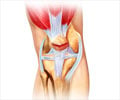Both rare and frequent exercising are likely to cause degeneration of the knee cartilage, says a new study.

According to the Centers for Disease Control and Prevention, approximately one in two people develop osteoarthritis by the age of 85 years.
The study analyzed the exercise habits of 205 patients between the ages of 45 and 60 for about four years by using questionnaires. Magnetic Resonance Imaging (MRI) was used to measure T2, a specific biomarker that monitors the correlation between the exercise habits of individuals and knee cartilage degeneration. By gauging the “relaxation times” on the bio-marker, data on the water content in the cartilage and collagen structure was collected. This helps to gauge cartilage degeneration.
It was found that those participants who exercised vigorously for one hour a day for three or more days per week, had increased T2 measurements, which suggested “poor cartilage health”. This was also the case in those who barely exercised.
Researchers are still unsure about the optimum level of exercise that can be recommended. However, they believe that “moderate exercises such as walking, playing golf, etc for less than two hours per day, for three or more days per week ,was associated with the best cartilage health as measured with cartilage T2.”
The results of this study might dampen the spirits of the fitness freaks and fanatics, however it is hoped that T2 relaxation time will, perhaps, make it possible to detect cartilage damage when it is still reversible.















